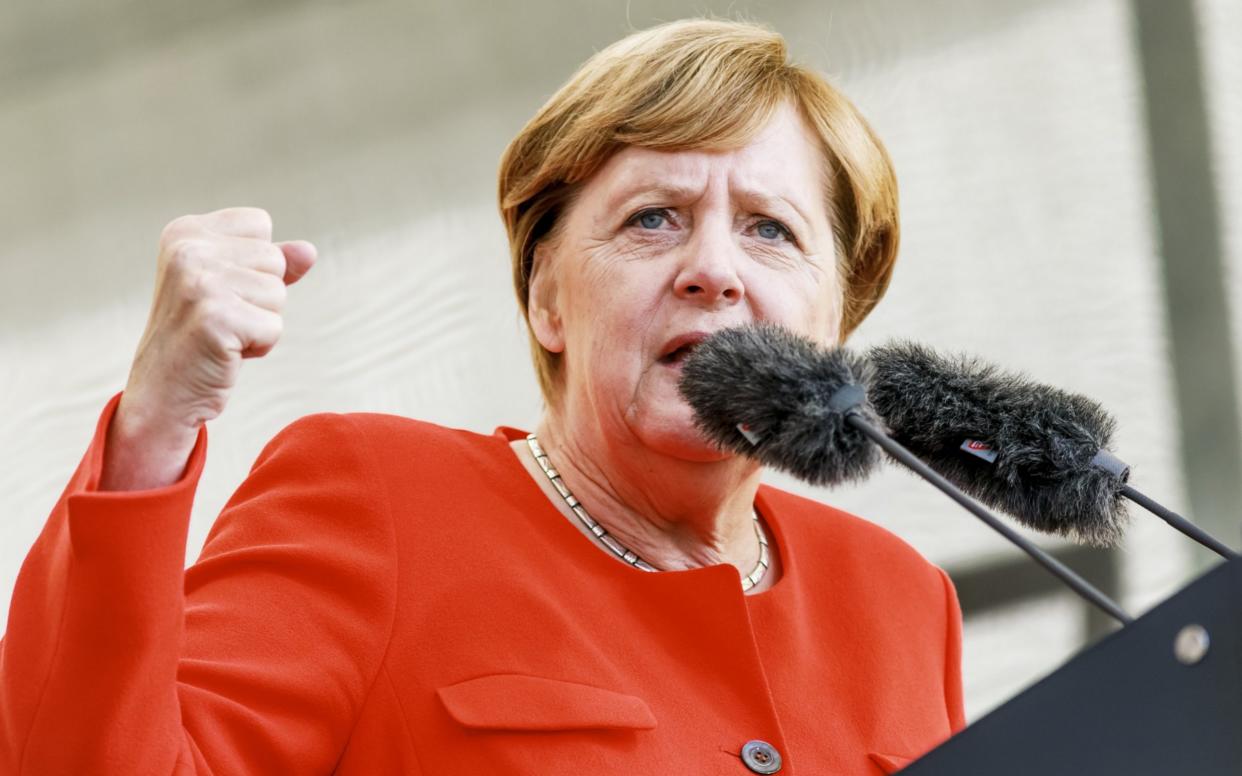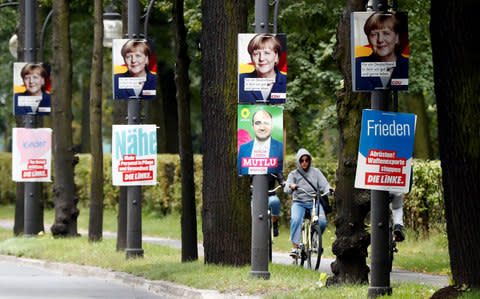What happens if Angela Merkel loses the German elections?

She has a 15 to 20 point lead in the polls. She has a growing economy, falling unemployment, and personal approval ratings that are way off the charts, while her opponents are hopelessly split. There are plenty of things the markets are worrying about right now. But Angela Merkel losing power in Germany next month is not one of them.
But hold on. Merkel has blown big leads in the past, she is fighting a campaign so complacent that it makes Theresa May’s look like a whirlwind of charisma and energy and, perhaps most importantly of all, there is a global backlash against establishment political leaders.
What would happen if she lost, or only limped back into power with a fragile coalition? There would be a sharp sell-off in European equities, a chaotic government in Berlin, and a more rapidly integrationist EU as France’s Emmanuel Macron became the Continent’s dominant political leader. It would create a huge shock, and the ripples would be felt everywhere.
There are not many safe bets out there, but the re-election of Angela Merkel as Chancellor of Germany for a fourth term when the country goes to the polls on Sept 24 looks to be among them.

At Paddy Power, she is 1-14 on to hold on to power, while her main rival the Social Democrat leader Martin Schulz is a 7-1 shot, and the next closest contender, the splendidly named Karl-Theodor zu Guttenberg, the former defence minister who could lead the centre right CDU-CSU if Merkel stumbled, is on 50-1. You can get better odds on Wayne Rooney being the top scorer in the Premiership this season, but that doesn’t seem terribly likely either.
Right now, Merkel has a commanding lead in the polls. The latest average sample put the centre-Right CDU/CSU on 39pc, the SPD on 24pc, with the far-Left Die Linke on 9pc, the pro-business Free Democrats on 8pc, the Greens on 8pc, and the anti-euro Alternative for Deutschland on 7pc.
Under Germany’s system of proportional representation, all six parties are likely to be represented in Parliament, but Merkel will be by far the dominant force. The only real excitement will be what sort of coalition she forms.
And yet, the one thing we have surely learnt in the past year is never to take any election for granted. When the experts say something is a done deal, it often pays to take the other side of the trade. There are signs that an upset could be on the cards.

In her first campaign as party leader, way back in 2005, Merkel managed to blow a lead of more than 15 points in the polls, which is how she ended up in a coalition with the Social Democrats. She is not a natural campaigner, with simmering discontent over her refugee policy.
And while she is personally popular, on the issues Germans care about she is not especially in tune with their views. The polling shows Germans are mostly worried about social inequality and fighting poverty, issues that play more naturally into the hands of the Left.
The economy is looking OK, with plenty of jobs. But increasingly, and this is often overlooked, the German economy looks worryingly like ours. There is lots of work, but none of it is very well paid, and most of the jobs are going to workers arriving from Eastern Europe (in the last three years, Germany has created two million new jobs, but only 400,000 have gone to the local unemployed, while the other 1.6 million have gone to new immigrants).
As we know in this country, that model looks good, and in some ways works really well, but it creates a lot of resentments which can suddenly bubble to the surface in unexpected ways.
Electorates have proved themselves ready for radical change, even if there is no pattern to what they want
From Brexit to Trump to the destruction of the French old guard by Macron, electorates have proved themselves ready for radical change, even if there is no very consistent pattern to what they want instead. And keep in mind that in both 2005 and 2013, the left (the SPD, Die Linke and the Greens) were very close to a majority in parliament, and Merkel only came to power because she was the only person who could assemble a governing coalition.
It is still a volatile mix. The Left Party could collapse, creating a surge for the SPD. The AfD could eat into Merkel’s support. So could the Free Democrats. With PR, and so many parties in the mix, there is plenty to play for.
The impact of Merkel losing would be huge – and very unpredictable. But there are three big ways it would immediately impact the markets. First, expect a sudden reversal in equities. Over the last six months, Europe has become the top destination for global money managers.
With the removal of political risk and the threat of a chaotic break-up of the currency receding, cash has been flooding into undervalued, ignored European markets. Italy, the most burnt out market in the world, has been leading that revival but France, Spain and, of course, Germany have all been surging upwards as well. All of a sudden, however, political risk would be right back on the table. And a lot of that money would suddenly start returning home again. The markets would get slammed.
Profile | Angela Merkel
Next, Germany would be set for a chaotic period of instability. Merkel’s strongest card is that she can lead a stable coalition. It is unlikely any rival could be nearly as secure in power. The most likely alternative is that the SPD’s Schulz leads a Red-Red-Green coalition or a slightly implausible SPD-Green-Free Democrat pact (the so-called Traffic Light option, because its colours would be red, green and orange).
Or a terminally weakened Merkel might cede leadership of a grand coalition to Schulz, or to a rival within her own party. Whatever happened, it would be far, far weaker that Merkel’s existing government, with a non-existent mandate, and a fragile grip on power. Not much would get done.
Finally, France’s President Macron would emerge as the dominant figure in Europe. With a personal mandate and a huge majority, he would tower above whoever was Chancellor in Berlin. Italy would not be much of a challenger, and nor would Spain, and the British are, of course, on the way out.
He would replace Merkel as the power-broker in the EU. His agenda? A radical push for rapid integration, with common tax policies and a spending ministry for the eurozone, as well as a tough stance over Brexit. Whether any of that would work is debatable, to put it mildly, but it is what would happen.
True, none of that is especially likely. The most plausible outcome is that by late September, a soporific Merkel will be safely installed back as Chancellor, heading a coalition committed to kicking every can possible down the road, and avoiding any hard decisions as long as she can.
But the past 12 months have shown no vote can be taken for granted – and even this one is not an exception. The markets often witness a September shock, and if one arrives this year, it is most likely to be an electoral upset in Germany.
How to connect with us | Telegraph Business on social media

